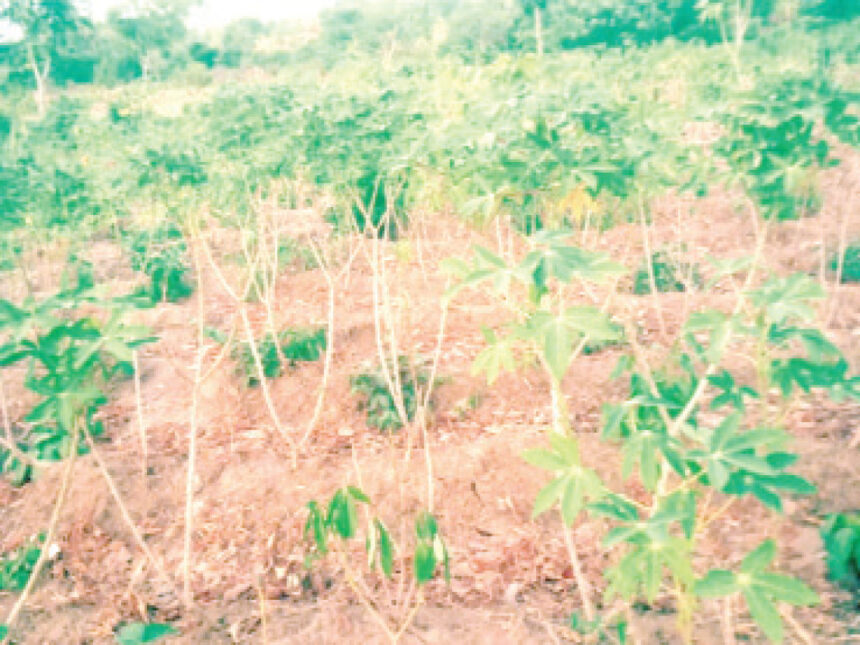•Farmers, communities confront lack of rainfall, peace
In this report, Vincent Kuraun examines how the absence of rainfall and attacks by Fulani herdsmen in Benue are impacting farmers and exacerbating their struggles.
DUBBED “the food basket of the nation,” Benue State has for many years served as a foundation for the nation’s agricultural production with its vibrant green landscapes and vast fields. But, in recent times, farmers in the state are faced with an unprecedented twin-challenge: an alarming absence of rainfall and a looming threat from armed herdsmen.
The lack of rainfall has, in no small measure, depleted the possibilities of getting huge harvest after farmers may have tilled and toiled on their farmlands for weeks and months. Even though the issues appears to be annual and perennial issue, some farmers in the state continue to farm with the hope of putting food on their tables and oiling the cog of food production for the country.
While farmers in the state have continued to battle lack of rainfall, their farmlands, in the last few years, have become slaughter slabs for many of them and their family members following the recurring invasion of blood-thirsty armed herdsmen, creating a landscape of despair that threatens the very livelihoods of the people who once sustained the nation.
For the past few seasons, the skies have largely withheld their bounty, leaving fields bone-dry and crops wilting. Traditionally, the region would be hit by heavy rains in April offering hope for farmers preparing to plant their staples, such as maize, yams, soybeans, cassava guinea corn, rice, etc but recently, the rains that usually invigorate the fields failed to materialise.
Experts attribute the rain shortages in Benue and other parts of Nigeria to the broader implications of climate change. As global temperatures rise, weather patterns become increasingly unpredictable. A report by the Nigerian Meteorological Agency indicates that rainfall deficits have been persistent since the beginning of the 21st century, with some areas experiencing drought conditions much earlier than anticipated.
Explaining the agricultural-rich history of Benue State, an accounting graduate of Enugu State University of Science and Technology (ESUT), who doubles as a farmer, Tyosenda Terhemen, told Sunday Tribune that the state’s well-known fertile lands and favourable climate supported the cultivation of a variety of crops, as the majority of the population depends on farming for their livelihood.
He, however, said the rising frequency of droughts in recent years has punctureds this reputation, severely impacting crop production and jeopardizing food security.
According to Tyosenda, “the effects are particularly devastating. The absence of adequate rainfall leads to poor soil moisture, stunted plant growth, reduced crop yields, and, in severe cases, complete crop failure.”
“One of the key crops affected by drought in Benue State is maize. Maize, which is highly sensitive to water stress, requires consistent rainfall during its growing season. Prolonged droughts hinder germination and reduce the size of maize cobs, resulting in lower yields. Similarly, yam production, another staple crop in the region, suffers as the tubers do not grow to their full potential without adequate moisture in the soil as we have witnessed in the past few years.
“Also rice cultivation, which is largely dependent on irrigation in some parts of Benue State, has also been severely impacted. The decline in water levels of rivers and streams used for irrigation has made it difficult for farmers to sustain rice paddies, leading to reduced harvests.
“Soybeans and other leguminous crops, essential to the local economy, are also facing reduced productivity during this time. For instance, our community is currently dealing with significant water shortages and a lack of quality seeds, which has consistently diminished the prospects for future farming plans,” he explained.
Elaborating on the detrimental effects of the rainfall deficit on both the community and the state, he mentioned, “The repercussions extend beyond individual farmers and carry significant economic and social consequences.
“It leads to decreased crop yields, resulting in increased food prices, which burdens household incomes and makes it challenging for families to meet basic needs. It is disheartening to witness many once self-sufficient farmers, who could provide for their families and educate their children, now unable to do so.
“We are currently facing food shortages in several communities due to this lack of rain, which could result in malnutrition, especially among children, and worsen poverty levels in rural areas.”
Another farmer, Smart Akyaana, who hails from one of the villages in Gboko Local Government Area of the state, expressed deep concern over the severe lack of rainfall, particularly during last year’s growing season.
According to him, this deficit has had a damaging impact on his crops, including yams, soybeans, cassava, guinea corn, and groundnuts.
“The rain that once came like a long-lost friend has become a rare occurrence, leaving my hopes for an abundant harvest hanging by a thread,” he stated. “Though, we are expecting heavy rainfall this year, the rains that were supposed to nurture the growth of my crops last planting season didn’t arrive, and when they finally did, it was far from sufficient.”
Smart had planted his soybeans, cassava, and groundnuts with great optimism, hoping this planting season would yield better results than the previous one. But each day brought disappointment as the sky remained resolutely clear, and the soil became increasingly parched. The guinea corn, plants, which should have thrived, appeared weak and frail, their leaves curling in the sweltering heat.
“The weather has drastically changed. Having been a farmer since childhood, I can say that I have never witnessed anything like this before. We rely on rain, but it feels as though it has deserted us. My community, along with neighbouring areas, shares our plight; we frequently discuss our fears about what may happen if this continues.
“Most of us in our communities here depend on our harvests to feed our children, provide education, and maintain our livelihoods.
“A farmer’s life is intricately linked to the seasons, but in recent years, that rhythm seems to have vanished,” he lamented. “I can only pray for rain. Even a small amount would help breathe life back into these crops. Without it, we risk losing everything we have worked so hard for.”
In a previous chat with Sunday Tribune, Chairman of the Makurdi Branch of Mbatierev Community Development Association in, Chief Mkpotyo Sebastine Terhemba, also lamented the lack of consistent rainfall during last year’s planting season.
“When the rains finally resumed, some crops that had managed to germinate began to grow, but the rainy season ended prematurely. This early conclusion of the rainy season hindered the yield of crops like soybeans, and other crops, such as yams, were similarly affected because they were unable to mature fully. As a result, the cost of staple food items increased, making it challenging for families to secure adequate food supplies,” he explained.
Herdsmen attacks and land-grabbing
He also shared insights with Sunday Tribune on the reoccurrence of herders’ attacks on farming communities, expressing concerns that this year could prove to be even more challenging for farmers in the state.
“Many areas experiencing these attacks are predominantly agricultural communities, raising the question of how a farmer can sustain their livelihood when they are forced to flee their homes during the planting season,” Terhemba said.
He recounted a troubling incident involving one of his relatives who was displaced from his community in the Ukum Local Government Area after herdsmen attacked the community and destroyed his farm and burnt down houses.
“This individual, who had completed his pre-farming preparations, now finds himself and his family residing in an IDP camp, unable to provide for their basic needs,” he said.
These unwarranted and largely unprovoked attacks have continued to worry the state government and Governor Hyacinth Alia who, while condemning the killing of 11 people in Otobi community of Otukpo LGA on Tuesday, April 15, said: “These horrible and terrible fighters are in the front lines. They come and they kill any person, irrespective of ethnicity on their way; they kill them all. The residents run away, but the attackers retreat for a few weeks and then return for a full-fledged occupation. This is land grabbing.
“We’ve lost 11 people. There are some villagers who are still missing. We’re hoping that they will be found. Since last night we deployed through the security heads and our security apparatuses have gone to calm the situation down.
“Because it is quite deeply concerning when you come in there, kill so freely and then no one is apprehended and then you move out and then you come and strike again. I think there’s every need for all of us to stay on the alert.”
It will be recalled that the Bishop of the Catholic Diocese of Makurdi, Most Rev. Wilfred C. Anagbe, had during his address to the House Committee on Foreign Affairs Africa Subcommittee on March 12, 2025, described the state as one of the most dangerous and insecure places in recent years, saying “The militant herdsmen are terrorists destroying society. They steal and vandalise, they kill and boast about it, they kidnap and rape, and they enjoy total impunity from the elected authorities. None of them have been arrested and brought to justice.”
Highlighting the increasing violence and insecurity faced by Christian farmers in Benue, the bishop described the region as perilous due to conflict driven by extremists who are attempting to eliminate the Christian farmers’ identity through violent means such as killings, abductions, and land occupations.
He noted that Benue’s Christian farmers are experiencing significant losses, being forced from their lands by militant herdsmen who act with impunity and often receive no intervention from authorities.
Scary statistics
Sunday Tribune reports that as herdsmen move southward in search of pasture, encounters between grazing cattle and crop-producing households have escalated, leading to confrontation. The situation has deteriorated over the years, transforming from isolated disputes into violent confrontations that claim lives and disrupt entire communities.
A report from Aid to the Church in Need (ACN) in 2023 indicated that over 400 people were killed, and more than 100 others were wounded, raped, or kidnapped in attacks on settlements and farming communities in just Benue State alone.
The report explains that the 119 attacks caused at least 414 deaths in a wide range of communities and locations within the Diocese of Makurdi and other parts of Benue State. These were, however, only the victims who were identified and counted.
Recently, Benue has become a focal point due to a series of attacks that have occurred over the past few weeks. Reports indicate that multiple communities have been targeted in April alone, resulting in numerous casualties and the destruction of property worth millions.
Just on Good Friday, it was reported that 17 people were killed in attacks by suspected militia in the Sankera axis of the state, specifically in the Gbagir and Logo Local Government Areas. The police reported that five individuals were killed in Gbagir during a skirmish while authorities were responding to the militia’s invasion. Simultaneously, 12 more fatalities occurred in the neighbouring Logo area.
This attack is coming two days after suspected herdsmen stepped up violent attacks on no fewer than three communities in the Otukpo Local Government Area (LGA) of the state.
The communities affected during the fresh attacks include Emichi, Odudaje, and Okpamaju, where five persons were killed in February. The communities came under simultaneous attacks just a day after the killing of 11 persons at Otobi Community, also in Otukpo Local Government Area.
Local sources confirm that several people may have been feared dead again in the fresh attack.
Wednesday’s attack came hours after Governor Alia confirmed the arrest of three suspected herders in connection with the invasion of Otobi village on Tuesday night.
The state governor, Reverend Father Alia, on Friday, said: “As of this moment, we have confirmed the tragic loss of 20 precious lives in the Sankera axis. Five corpses were initially recovered in Gbagir and taken to the mortuary. Two more were later found by residents searching for their loved ones.”
He, therefore, called on the people of the state to “speak up and share information with our security agencies. Help us fish out the perpetrators of these evil acts. Our strength lies in our unity. Benue will not bow to fear. We will rise, rebuild, and remain unshaken.”
In just a few years, many lives have been lost in the state and many more displaced. Internally displaced persons (IDPs) camps now dot the state, where families that once thrived on agriculture now depend on humanitarian aid. They carry the weight of grief and uncertainty, unsure of when or if they will return to their ancestral lands.
As the violence continues, the economic implications for Benue State are dire. Farmers, once the backbone of Nigeria’s agricultural production, are unable to cultivate their land due to fear of attacks. With inflation rising and food shortages looming, the conflict aggravates Nigeria’s already fraught economic situation.
“When farmers cannot farm, we all suffer,” says Dooshima Orkaa, a PhD student at Benue State University in Makurdi. “Food prices soar, and nutrition levels decline, leading to a cycle of hunger and instability.”
“Businesses are also affected; market activities dwindle as vendors fear for their safety. The agricultural sector, vital not only to Benue but to the entire nation, finds itself at a crisis point, requiring urgent intervention from local and federal authorities.” Dooshima added.
Also reacting to the wanton killing in the state, a clergy, who craved anonymity, said: “It’s truly unfortunate that our visitors have claimed all that we once held dear; they have inherited all our inheritance. They’ve taken over our homes and our lands, yet it seems that it’s still not sufficient for them.
“They want us to abandon our ancestral homes, but dear Lord, where else can we turn? Where else can your children go? Please, Lord, don’t remain silent.
“Look upon us and see the blood of the innocent flowing like a river. Our enemies lurk in the shadows while we cry out in despair. What can we possibly do? Our land mourns as we feel increasingly powerless; our land is grieving.
“Our pregnant women are being killed, our children are being slaughtered and the elderly are not spared either. Our youth are being oppressed as they are being wiped off.”
Living in fear
The traditional farming methods that previously promoted community and cooperation have turned into mere survival tactics, as the impoverished farmers who once depended on their lands to provide for their families and educate their children now live in constant anxiety of losing their crops to the encroachment and land theft by herdsmen.
As a result, many farmers are abandoning their fields, opting to flee to nearby towns in search of safety, and the rural economy, once vibrant due to agriculture, is deteriorating, which adversely impacts local markets and food supplies.
The once-thriving markets in the hardest-hit regions now reflect the grim reality of scarcity. Vendors struggle to maintain their inventories as supplies diminish and prices of staples items escalate.
The repercussions go beyond immediate food shortages as families are facing malnutrition and health challenges due to an inability to afford balanced meals. Children, the most vulnerable, are suffering the most, with school attendance declining as parents can no longer afford to send them to school over fear of attacks by the herders.
As the people of Benue State grapple with these adversities, the government must step in, ensure safety for farmers, and promote sustainable agricultural practices that are less reliant on rainfall.
Despite diminishing rainfall and escalating fears, there remains hope for the farmers of Benue State, contingent upon urgent collective action and support from the relevant authorities, to prevent their land, once a source of nourishment, from further descending into conflict.
While Benue State farmers await the rains and the return of peace, their hope for a brighter future hinges on unity and understanding amid these hardships. The struggle for survival continues, and with governmental support, Benue’s farmers believe they can reclaim both their fields and their lives.
READ ALSO: We’ve put protective measures in place for corps members — Benue gov
WATCH TOP VIDEOS FROM NIGERIAN TRIBUNE TV
- Let’s Talk About SELF-AWARENESS
- Is Your Confidence Mistaken for Pride? Let’s talk about it
- Is Etiquette About Perfection…Or Just Not Being Rude?
- Top Psychologist Reveal 3 Signs You’re Struggling With Imposter Syndrome
- Do You Pick Up Work-Related Calls at Midnight or Never? Let’s Talk About Boundaries








